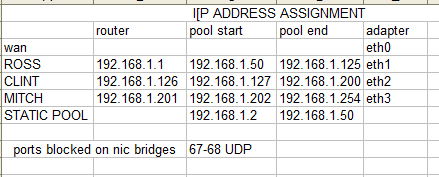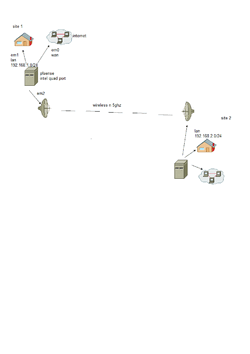- Joined
- Jan 14, 2011
ok so the basic idea, cousin lives right down the road, i have some 5ghz network bridges coming in wed, the first and easiest idea i had was to just add another nic, bridge it to lan and block ports 67-68 on that bridge so that our dhcp servers wouldnt talk to eachother then set our dhcp pools accordingly so that we wouldnt have any overlapping ip addresses, alls well. p.s. sthe "static pool" is for devices such as servers that we dont want plopped into the dhcp pool

but that leaves us with only 250 ip addresses to share. my next idea was to have each of us be on a different range like
ross 192.168.1.0/24
clint 192.168.2.0/24
mitch 192.168.3.0/24
and instead of just bridging the connections setup static routes between the nic's (will be using a quad port adapter and each of us will have our own port.) this would give us each plenty of addresses (253)
how in the world do static routes work, how could we access each others machines on each other's networks while keeping our routers from trying to tell each others stuff what to do ect. ive tried to do some reading but i dont see anyone else trying to achieve what we are doing we DO NOT want to share internet access we want our own machines to access our own internet only, why i was going to block the dhcp ports between the networks.


but that leaves us with only 250 ip addresses to share. my next idea was to have each of us be on a different range like
ross 192.168.1.0/24
clint 192.168.2.0/24
mitch 192.168.3.0/24
and instead of just bridging the connections setup static routes between the nic's (will be using a quad port adapter and each of us will have our own port.) this would give us each plenty of addresses (253)
how in the world do static routes work, how could we access each others machines on each other's networks while keeping our routers from trying to tell each others stuff what to do ect. ive tried to do some reading but i dont see anyone else trying to achieve what we are doing we DO NOT want to share internet access we want our own machines to access our own internet only, why i was going to block the dhcp ports between the networks.

Last edited: